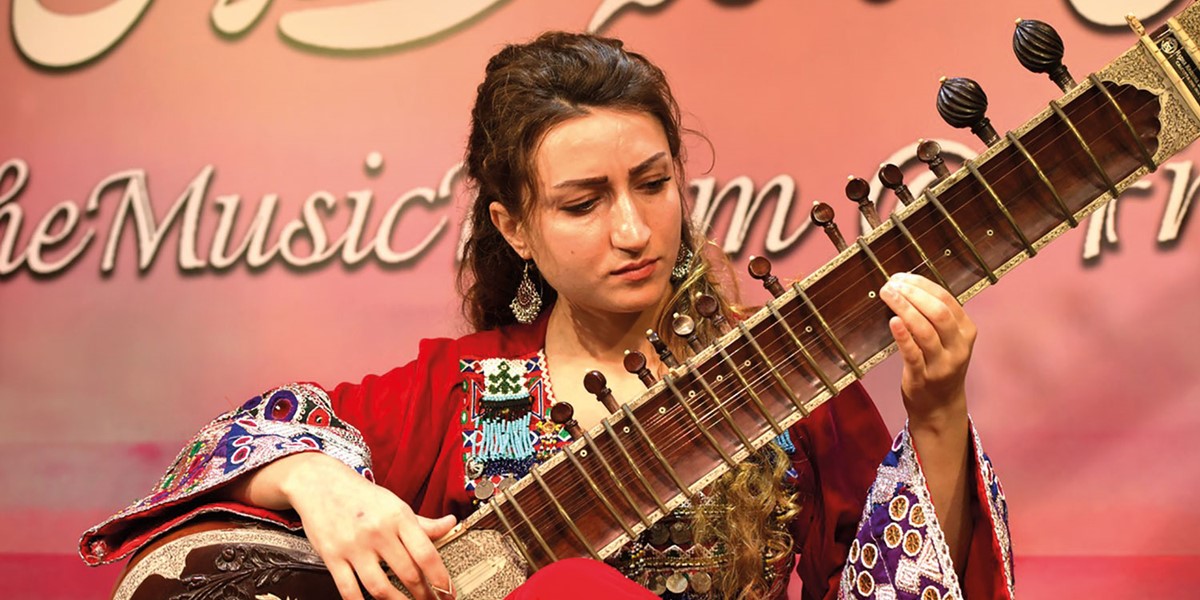Thursday, April 4, 2024
The Afghan Youth Orchestra offer hope in troubled times
Encounters with the Afghan Youth Orchestra find Simon Broughton upbeat about the state of the region’s traditional music

Gulalai Reha on sitar (photo: Ashok Patel)
The Afghan Youth Orchestra made it for a South Asian Sounds concert at London’s Southbank Centre plus dates in Liverpool, Manchester and Birmingham by the skin of their teeth. Part of the Afghan National Institute of Music (ANIM), they are currently based in Braga, Portugal where they’ve been given asylum since 2021. Their UK visas were turned down just days before the concert. After spending seven months and over €12,000 on biometrics and visas for the tour, Jay Visvadeva, artistic director of Sama Arts UK, who organised the visit, called the Home Office decision “callous and inhumane.” After a vigorous social media campaign, media stories and political pressure, the Home Office saw sense and overturned their decision several hours later. However, by that time the flights had been cancelled and fifty new flights had to be booked. “It was a totally unfair decision on the students and on the public who were keen to see them,” Visvadeva says.
The night after their London concert, the Youth Orchestra were invited to Rahmat Simab’s Music Room where they were richly fed and ANIM Director Dr Ahmad Sarmast was given an award “for his noble and historical work for the music of Afghanistan.” Sarmast founded ANIM in Kabul in 2010 with teaching for both Western music and traditional Afghan music. Their female orchestra, Zohra, attracted particular attention. The ANIM students and teachers left Kabul following the Taliban takeover of August 2021 – when their premises were ransacked.
At The Music Room in London there was a special concert featuring the traditional musicians of the orchestra. It began with sitar players Gulalai Reha and Shabana Gulistani with Emat Karimi, a fine tabla player who accompanied all the musicians. I talked to Reha (25) before the concert and she explained how she’d been drawn to Afghan and Indian classical music from an early age. Her parents were not keen, but she insisted and left her home in Gulistan (between Kandahar and Herat) for a hostel in Kabul so she could study sitar at the ANIM school. She was also a member of the Zohra orchestra. Her younger sister also went there to learn violin, but didn’t admit it to her parents for a year. In Afghanistan, learning music needs extra determination and courage as well as the application required anywhere else. The two sitar players on stage were an inspiring sight. Reha was in a resplendent red dress with traditional Pashtun designs. There was also a quartet of rubab players and solo rubab from Ramiz Safar. With its muscular tone and filigree delicacy, the rubab is Afghanistan’s signature instrument.
It was 284 members of ANIM that were given asylum in Portugal and accommodation was made available in Braga. But many members of the school chose to join family and friends in Germany or elsewhere. Ahmad Sarmast says they lost 30 to 40 percent of their students. However, the London concert was clearly a moving occasion and many Afghan music lovers said it was a sign of hope they hadn’t seen for ages. Certainly the traditional music I saw at The Music Room gives cause for optimism while the situation is so grim in Afghanistan.
This article originally appeared in the May 2024 issue of Songlines. Never miss an issue – subscribe to Songlines today

